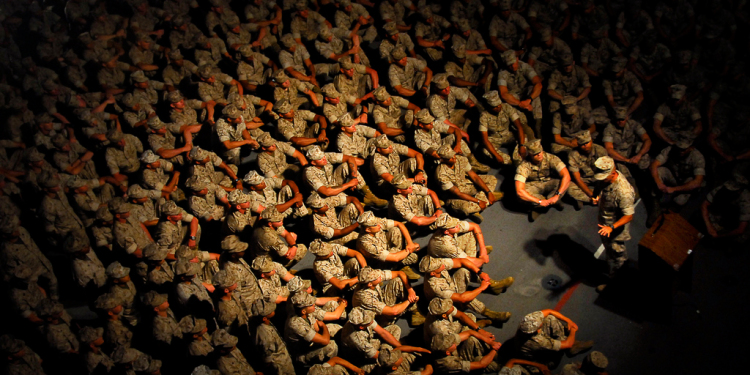Because a leader always says “we”, even when he’s saying “I”
Leaders are the first ones to step up against danger, the first ones to head into uncertainty, the first ones to volunteer… but they are also the last ones to take credit, the last one walking with the people. Leading is about sacrificing oneself, so that other people may gain. It is about putting others first. Always.

Let us picture a United Sates marine corps boot camp: new group of recruits, unsure of their decision and disoriented, arriving to the military camp. These recruits are probably encountered by a drill instructor that will quickly show them who is in charge. And the first, most important lesson to teach them: they must forget their individual selves, their lives, their own worries and replace them with the idea of a team. The word “I” is replaced by “we”, and with it a change in mentality: being part of the team means sharing strength. It is the idea of unit cohesion or teamwork, where you end up thinking “if I mess up, those guys next to me will suffer”.
What makes the United States marines so efficient and qualified to confront external threats? The idea that they can stand with courage united in the battlefield and face any danger, only because they fear no danger from each other. Several bodies, one mind. And this feeling of belonging is not new, nor exclusive to the military. If we look back at 480 B.C. the following was said about the brave Spartan warriors: “Spartans excuse without penalty the warrior who loses his helmet or breastplate in battle, but punish with the loss of all citizen rights the man who discards his shield. A warrior carries helmet and breastplate for his own protection, but his shield is for the safety of the whole line.”[1]
Transforming this idea to today’s business world, were we do not have an army of warriors nor a troop of soldiers, we find employees, workers and executives battling against the unpredictable waves in the market. We have teams, with a leader guiding them, that work not in a bureaucratic way, but in a comradely friendly way. Many teams in an organization that keep everything working neatly, and many leaders that, like a friend, make sure that the team is working towards the idea they believe in and trust. A group of employees under the protection and guidance of a leader, that will work together as a team, as friends.
Here is where leaders take significant importance. When my classmates in the Economics, Leadership & Governance degree and I were preparing for our Leadership practical exercises, we were faced with an important question: Were we all leaders? With our current degree, we were very confident in calling ourselves leaders right away. And yes, we were all capable of directing the practical activities, we were all willing to take the stand, and we were all desperate to be heads of a team. But a realization came to mind: how can we all be leaders, if we have no one to lead?
Leaders need a team, as much as teams need a leader. If we picture the head of a team, on its own, it is nothing but a sole opinion. And leaders are there to serve the team, to help everyone reach and surpass their own goals and expectations. Overachieving, and celebrating their success.
To the outside world, a leader is the representation of the ideas and values of everyone in an organization. The act of leading signifies taking decisions on behalf of others. It is a great honor and responsibility to be the symbol of a group, who must consider and take into account every aspect and consequence of every decision taken and its effects on the people. When a leader speaks, he does not speak for himself, but his voice is instead the reflection of many other voices in his team. Whatever decision, whatever act, whatever consequence, the people come first. Even putting his own wellbeing aside, leaders sacrifice themselves for their team without a second thought. It is not for the glory or the fame, it is because a leader understands with humility that there are other people who could do his job better than him, so the privilege of representing them is to be taken with pride and honor.
Trust, cooperation and effective problem solving is only possible when a team share common values and have a strong sense of empathy. It can only happen when the members feel protected by their leader. And the team starts to swift from co-workers to something close to friendship, or even family.
[1] Pressfield, Steven. Gates of fire: an epic novel of the Battle of Thermopylae. New York: Bantam, 1999. Print.